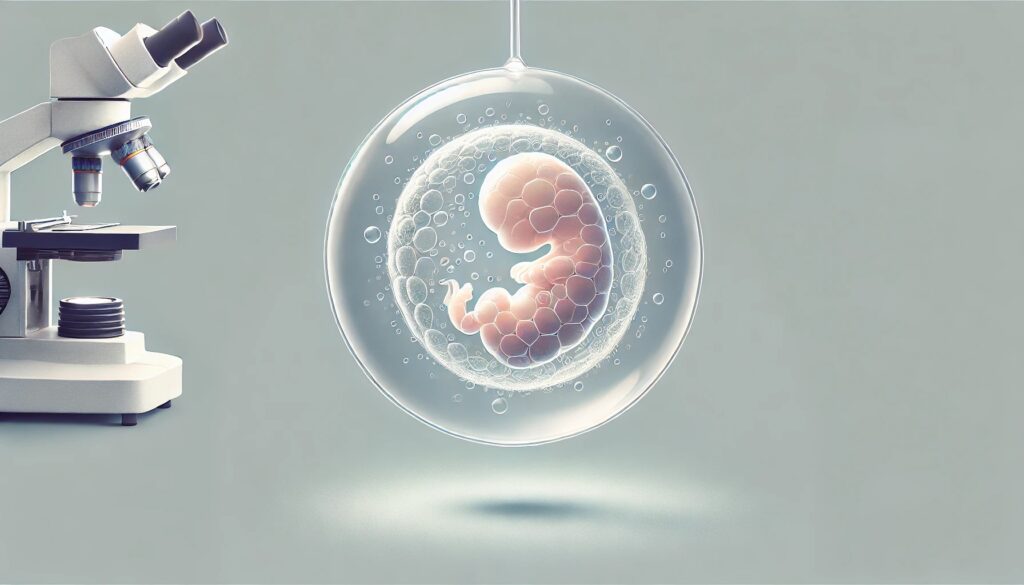Table of Contents
- 1 What is Embryo Donation
- 2 Donated Embryos – Availability
- 3 Where Do Embryos for Adoption Come From?
- 4 Embryo Donation Abroad – The Process
- 5 Embryo Donation Costs
- 6 Embryo Donation – Popular Destinations
- 7 Embryo Donation in Spain
- 8 Embryo Donation in the Czech Republic
- 9 Embryo Donation in Greece
- 10 Embryo Donation in North Cyprus
- 11 Embryo Donation in Portugal
- 12 Embryo Donation in Latvia
- 13 Embryo Donation – Before You Choose an IVF Clinic
Many patients who qualify for the so-called embryo donation seek this type of treatment abroad. The most important reasons are the availability of embryos for adoption in the patient’s country (waiting time) and the costs of such a procedure.
What is Embryo Donation
Embryo donation is the transfer of a (high-quality) embryo obtained during the IVF treatment of other patients to a couple or woman in need of adoption. Embryos are usually provided on day 5 of development, known as the blastocyst stage. Transferring embryos at this stage can enhance the chances of a successful implantation and pregnancy, as the embryos have developed further and can be better assessed for quality. Embryo adoption can be highly successful if the clinic provides high-quality embryos.
Donated Embryos – Availability
The availability of embryos intended for adoption is limited because a large group of patients who enter the IVF program will have a limited number of embryos, which they use exclusively during their own treatment. A small group of patients have surplus embryos, which they decide to donate to an embryo bank.
In most countries, the transfer of an embryo, in accordance with the guidelines of international infertility organizations, should occur after matching it to the phenotypic characteristics of the recipient or couple intending to adopt such an embryo.
You may be interested in reading: Egg Donation IVF abroad – step by step
Where Do Embryos for Adoption Come From?
Most embryos that can be designated for adoption (with the consent of the patients who own them) come from younger patients from whom a larger number of oocytes (eggs) can be retrieved. Usually, these are women up to 34 years old who are undergoing treatment for infertility.
Embryos intended for adoption can also originate from egg donation programs. During such programs, statistically more embryos are created than in IVF programs using the patient’s own eggs.
| Type of Embryo Intended for Adoption | NOTES |
| Embryo obtained during patients’ treatment as a result of fertilizing the patient’s own eggs —with partner’s sperm or donor sperm | Embryo Donation |
| Embryo obtained during patients’ treatment as a result of fertilizing eggs obtained from a donor—with partner’s sperm or donor sperm | Embryo Donation |
| Embryo obtained as a result of fertilizing donor eggs — with donor sperm. Please note: Some clinics advertise this option as Embryo Donation | Double Donation |
Embryo Donation Abroad – The Process
The process of embryo adoption in clinics abroad is not complicated. It can be divided into four stages, preceded by signing the necessary documents and paying the fee for the entire program:
- Selection of Embryos (based on blood type and visual characteristics of the donor and recipient)
- Preparation of the Recipient for embryo transfer
- Thawing of Embryos
- Transfer of Embryos into the uterus
Generally, clinics abroad have experience in organizing the treatment process for foreign patients in a way that minimizes the number of clinic visits—often to just one.
Embryo Donation Costs
The costs of embryos available for adoption offered by clinics vary between countries and also among clinics within a country. In Europe, it can be assumed that embryo donation costs range from €1,500 to €5,000.
Typically, the least expensive embryos are those obtained from patients’ own eggs during their treatment. The waiting time for such embryos in most countries can average from 3 to 24 months. The waiting period depends primarily on the recipient’s characteristics (height, eye color, hair color, hair type, and skin complexion) because embryos are matched according to the recipient’s phenotype. So, if the desired embryo is not available, the recipient must wait until a similar couple or patient is treated at the clinic and decides to donate their embryos to the bank.
The most expensive are embryos obtained through the so-called Double Donation prograns, because in such a program, the clinic incurs costs related to egg donation (donor compensation) and the costs associated with fertilizing the oocytes with donor sperm (from a sperm bank).
Embryo Donation – Popular Destinations
Most clinics in popular countries where patients go for IVF treatment offer embryo donation in various forms. Remember that embryo donation is a type of IVF treatment, so patients are subject to the rules and restrictions in force in a given country—for example, the maximum age of the female patient and the maximum number of embryos to transfer during one cycle.
Embryo Donation in Spain
In Spain, there are many clinics that offer treatment to patients from abroad—particularly in Madrid, Barcelona, Alicante, Valencia, and Bilbao—and most of them offer donated embryos. The cost of embryo donation in Spain ranges from €3,000 to €5,000. The maximum age for a woman who can benefit from embryo donation is 50 years, although some clinics allow treatment for patients up to 54 years old. In clinics that perform a large number of cycles, the waiting time for embryos can be shorter—below 6 months; in some cases, it can even be up to 12 months.
Donated embryos in Spain are anonymous.
Check which clinics offer embryo donation in Spain >
Embryo Donation in the Czech Republic
The Czech Republic is a popular country chosen by many patients not only from Europe. Most clinics offer embryo donation at prices ranging from €2,000 to €3,500. The maximum age of the female patient is 49 years. Single women cannot receive treatment in the Czech Republic. The waiting period for embryos varies depending on the clinic; it can be from 3 up to even 12 months.
Donated embryos in the Czech Republic are anonymous.
Check which clinics offer embryo donation in the Czech Republic >
Embryo Donation in Greece
In Greece, the most popular IVF clinics offering embryo donation are located in Athens and Thessaloniki. The average cost of embryo donation in Greece is around €3,500 to €6,000. In Greece, patients up to 54 years of age can benefit from embryo donation.
Donated embryos in Greece are anonymous.
Check which clinics offer embryo donation in Greece >
Embryo Donation in North Cyprus
North Cyprus is a frequently chosen country for IVF treatment and egg donation. However, the costs of embryo donation, ranging between €5,500 and €6,000, are among the highest in Europe, which leads many patients to opt for other, less expensive countries. Nevertheless, North Cyprus offers a high availability of donated embryos and a relatively short waiting time, and clinics accept patients up to 48 years old. Therefore, for older patients and those who are pressed for time, North Cyprus may be worth considering. The availability of donated embryos can vary between clinics.
Donated embryos in North Cyprus are anonymous.
Check which clinics offer embryo donation in North Cyprus >
Embryo Donation in Portugal
Portugal is one of the few countries often chosen by international patients that offers non-anonymous egg donation—the egg donor remains anonymous to the recipient, but the child born can learn the identity of the donor. The same rule applies to embryo donation. In Portugal, embryo donation costs between €2,000 and €3,000. The maximum age of a female patient who can undergo treatment in Portugal is 50 years.
Check which clinics offer embryo donation in Portugal >
Embryo Donation in Latvia
Latvia is one of the few countries where, according to the law, there is no maximum age limit for female patients who can be treated in IVF clinics. Most clinics assess patients on an individual basis. The costs of embryo donation in Latvia range from €4,000 to €4,500. Embryo donation in Latvia is anonymous.
Check which clinics offer embryo donation in Latvia >
Embryo Donation – Before You Choose an IVF Clinic
Before you undergo the procedure of embryo donation at your chosen clinic, it’s worthwhile to first ask questions that will make it easier for you to decide about treatment at that clinic.
Embryo Donation in Europe – Important Questions You Should Ask the Clinic
- Where do the embryos I will receive come from, and what is their quality?
- Will I know the age of the person who donated the embryos to the bank?
- How much does embryo donation cost, and what is the billing model—is there a fee for each embryo, or does it cover a minimum group of embryos?
- How are the embryos matched to the recipient and her partner, or just to the recipient (if she is a woman without a partner)?
- What is the waiting time for embryos from donors?





